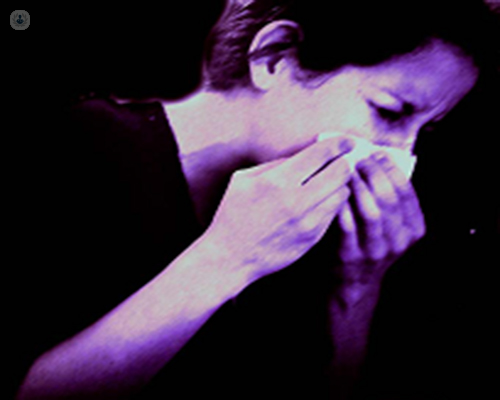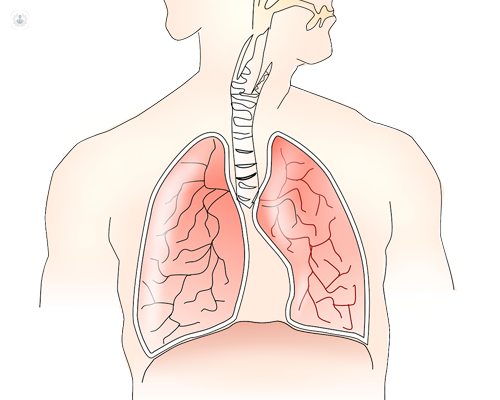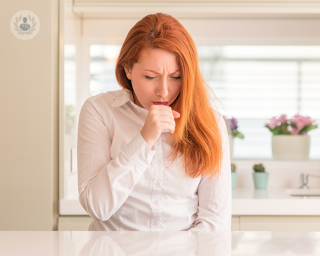Chronic bronchitis
Dr James Ramsay - Pulmonology & respiratory medicine
Created on: 11-13-2012
Updated on: 05-30-2023
Edited by: Sophie Kennedy
What is chronic bronchitis?
Chronic bronchitis is classed under the umbrella term COPD (chronic obstructive pulmonary disease). Bronchitis occurs when the bronchial tubes, the breathing tubes that supply oxygen to the lungs, become inflamed. When the bronchi are inflamed more mucus is produced, this is what leads to breathing difficulties and coughing. Bronchitis can either be acute or chronic. It is classified as chronic when the cough lasts at least three months of the year for at least two consecutive years.

Does bronchitis damage the lungs?
Over time bronchitis can cause damage and scarring to the lungs, resulting in reduced functionality.
What are the symptoms of chronic bronchitis?
- Phlegmy cough
- Breathing difficulties
- Wheezing
- Chest tightness
- Raised temperature
- Fatigue
As it is a chronic condition, the symptoms last a long time and don’t go away for several months.
What causes chronic bronchitis?
Unlike acute bronchitis, it is not caused by a viral or bacterial infection. Cigarette smoke is the main cause. Inhaling smoke irritates the lungs and can cause large amounts of mucus. Chronic bronchitis can also affect people who have been exposed to chemical vapours, dust, and other airborne substances in polluted air. It is rare that a genetic condition would predispose someone to chronic bronchitis.
How can chronic bronchitis be prevented?
The best way to prevent chronic bronchitis is to never smoke or to quit smoking. The more smoke you inhale, the worse it is for your lungs. When you quit smoking, breathing will improve, as well as your cough, your lungs will begin to function better, and the chances of getting lung cancer are reduced.
Another thing that can be done is to avoid other substances that could be harmful to your health such as lacquer aerosols, spray deodorants, or spray paints. It is also advisable to avoid inhaling dust or chemical vapours. Humidifying the air can help.
Another way to take care of your lungs is to use a mask that covers your mouth and nose when using products such as varnish, paint, or any other chemical substance with strong vapours.
When should one see a doctor?
If a cough persists, produced mucus or blood, and prevents you from sleeping, you should visit a doctor. Having a temperature and shortness of breath are also warning signs.
How is chronic bronchitis diagnosed?
A doctor will perform a physical exam and consider one’s health history. The following tests may also be done:

Can a person be cured of chronic bronchitis?
As the name suggests, chronic bronchitis never completely disappears and it often intermittently returns for long periods of time. Symptoms can get better and be managed.
How is chronic bronchitis treated?
Treatment for chronic bronchitis can help relieve the symptoms but it does not cure them. The medications can help clear the airways and get rid of mucous. They can be oral or inhaled, such as bronchodilators or steroids. Oxygen therapy is also recommended in some cases, this kind of pulmonary rehabilitation can relieve symptoms and ensure a better quality of life.
Pulmonary rehabilitation, involving a diet and exercise programme along with psychological counselling, can improve the overall well-being of the person. In extreme cases, a lung transplant may be an option.
What complications can arise from chronic bronchitis?
If left untreated, chronic bronchitis can result in:
- Frequent airway infections, like colds, flu or pneumonia
- A blue appearance of the skin, due to lack of oxygen
- Swollen feet
- Heart failure
How long can you live with chronic bronchitis?
The overall prognosis for someone living with chronic bronchitis depends on the patient's overall wellbeing as well as the severity of their disease. Whether they smoke and react well to treatment are other factors. Many people can live normal lives with chronic bronchitis if they adhere to medical advice and treatment.










